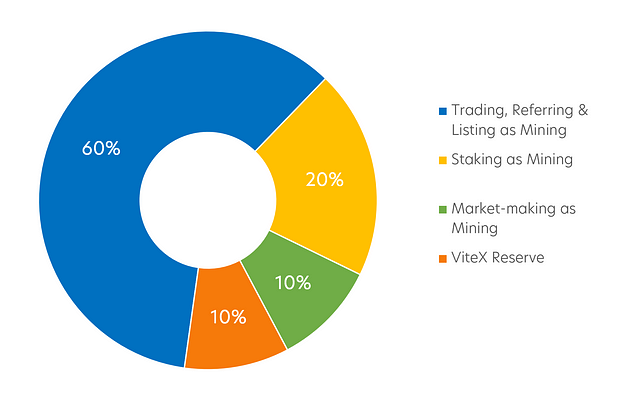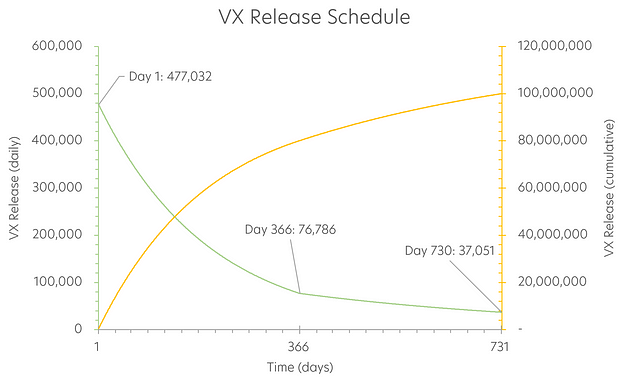ViteX 101: Update. Everything you need to know about ViteX and VX!
-

After we announced a decentralized exchange (DEX) built on the Vite platform, we received many suggestions from our community. Realizing that our setup wasn’t perfect, we figured there’s no better way to improve the product than to have our community vote on changes to be made. After three rounds of voting, here is the latest iteration of our DEX economic model as we approach the launch date of July 30, 2019.
Note: These rules are the latest iteration, but by no means unchangeable. This article is a summary of the ViteX economic model from inception until today.
For interested parties, below are links to our community voting results:
Round 1: Transaction Fees and Staking
Round 2: Dividend Pool Parameters and Distribution
Round 3: Revised Transaction Fees & ViteX Operator RoleIntroduction to ViteX
ViteX in a Nutshell
ViteX is a decentralized exchange (DEX) developed on the Vite public chain with its own native token, VX, that is exclusively mined by the ViteX community.
Features of ViteX
ViteX is of the community, by the community, for the community.
- Uncompromising Performance: ViteX is a decentralized application (dApp) built on the Vite public chain. Utilizing Vite’s directed acyclic graph (DAG) ledger and asynchronous architecture, ViteX offers fast transaction confirmation and order book matching (comparable the efficiency of a centralized exchange) while operating on a fully decentralized platform.
- Open and Transparent: Many other DEX platforms operate on partially decentralized models, with on-chain asset management modules and off-chain order book matching modules. ViteX, on the other hand, allows both modules to be run entirely on-chain, ensuring full transparency in all aspects of the trading experience.
- Fair for All: The VX token will be mined by the community and be used to determine community members’ dividend ratios. VX will have no pre-sales, pre-mining nor initial coin offering (ICO). 90% of the total supply will be distributed to the trading community and the remaining 10% will be given to Vite Labs. Additionally, all transaction fees collected on ViteX will be distributed back to traders based on the amount of VX they hold.
- Community-Driven: As a new generation of decentralized trading platforms, ViteX has a unique ViteX Operator role. You can think of a ViteX Operator (“Operator”) as an individual or entity that operates their own mini-DEX (called a “Zone”) on top of ViteX. Within their respective Zones, Operators can set up trading pairs, customize transaction fees and generate profits from users that choose to trade on their Zone. Blockchain projects, investment funds, centralized exchanges and individual traders are eligible to become Operators.
ViteX Transaction Fees
For every transaction, ViteX will charge a Base Transaction Fee of 0.2%. Since Operators have the option to charge separate transaction fees on their respective Zones, traders may have to pay fees depending on the Zone(s) they trade on. However, users can reduce their Base Transaction Fee to 0.1% by staking 10,000 VITE (not VX) for a minimum of 30 days.
VX: What is it and how do I get it?
VX in a Nutshell
VX is the native token of ViteX. Users holding VX enjoy dividends of transaction fees and listing fees. VX has no public sale nor private sale. Users only get VX through mining.How do I get VX?
- Trading is Mining: This one’s easy. Whenever you execute a trade (i.e. take an order off the order book), you get some VX. The amount of VX you receive is calculated based on the amount of trading fees you paid, proportional to the total amount of trading fees collected by ViteX on that day.
- Staking is Mining: The Vite public chain requires quota to properly allocate is computing resources. Quota is obtained by staking VITE. If you stake VITE to help ViteX obtain the quota it requires to run, you get VX.
- Market-Making is Mining: Place orders to boost liquidity on ViteX and get rewarded with VX. The amount of VX depends on two factors: 1) the amount of time your order remains on the order book 2) the amount of deviation from the best bid and best offer in the order book spread. The longer your order remains in the order book, the more VX you receive. The less your order deviates from the best bid/offer, the more VX you receive.
- Listing is Mining. List new trading pairs to mine VX. A user (“token issuer” or “operator”) that lists a new trading pair receives VX. The token issuer’s reward is calculated as if he/she executed a trade involving a transaction fee of 1,000 VITE.
- Referring is Mining. Users can apply for referral codes, to refer friends to become traders on ViteX. Let’s say Bob gets a referral code from Alice. When Bob signs up and starts trading on ViteX, he gets 10% off of all trading fees (Base Transaction Fee + any applicable Zone Fees) on ViteX. Alice, on the other hand, benefits from Bob’s trading activity as 5% of Bob’s accumulated trading fees count for Alice’s accumulated trading fees. For example, if Bob accrues $100 in trading fees and Alice accrues $200, Alice will effectively have $205 in accumulated trading fees (thus boosting the ratio of her trading fees to the total collected fees).
Note: For listing as mining, there is a cost of 10,000 VITE for each new token issued on the Vite chain. 50% of this fee (5,000 VITE) will be burned and the remainder will be distributed to VX holders.

Trading, Referring and Listing
60% of VX released daily will be distributed to traders who mine within this category. There are currently four markets: BTC, ETH, VITE and USDT. Each market will account for 15% of the daily VX distribution.Staking
20% of VX released daily will be distributed to users who mine within this category.Market-Making
10% of VX released daily will be distributed to traders who create orders.Benefits for VX Holders
One word: dividends. All fees collected by the ViteX platform will be kept in a shared pool and slowly distributed at a rate of 1% daily. For any given day, the total fees collected during that day will be fully distributed by the 100th day.This model is meant to stabilize fluctuations in the value of VX over time. VX holders will not only benefit from a steady stream of transaction fees, but also, an ever-increasing shared pool.
Note: A minimum of 10 VX is required to receive dividends. By holding more than 10 VX, one may continuously obtain dividends of daily trading and listing activities. Although VX is only earned through mining, VX will be tradeable on ViteX.
How is VX distributed?
The total supply of VX will be 100,000,000 with no inflation. After the launch of ViteX, the total supply of VX will be fully distributed within two years.- 477,210 VX will be released on the launch date of ViteX. During the first year, the number of VX released will decrease by 0.5% every day. According to this formula, 80.13% of total supply will be released in the first year.
- During the second year, the number of VX released will decrease by 0.2% every day. 37,051 VX will be released on the last day of the second year.

ViteX Operators: Who are they and what can they do?
ViteX Operators in a Nutshell
- Choose tokens they wish to list on their Zone: It is the Operator’s responsibility to do their own due diligence when it comes to listing tokens. The Operator also reserves the right to suspend trading activities for any trading pair listed on their Zone.
- List trading pairs: ViteX will provide the cross-chain gateways for BTC, ETH and USDT trading pairs. If Operators wish to list other trading pairs, they must establish their own cross-chain gateways.
- Customize the transaction fee for each trading pair: ViteX charges a base transaction fee of 0.2% for all transactions that occur on the ViteX platform. The Operator has the right to increase this base transaction fee by 0–0.2% (i.e. the trader’s fee can be anywhere from 0.2%-0.4%) and any extra profit goes to the Operator. The Operator reserves the right to adjust the transaction fee at any time.
- Transfer their Operator accounts to other parties: If an Operator no longer wishes to run his or her Zone, they can transfer the rights to their Zone to another individual or entity.
================================================================
Official: https://www.vite.org/
Instagram: https://www.instagram.com/vite.labs/?hl=en
Twitter: https://twitter.com/vitelabs
Vite Forum: https://forum.vite.netTelegram:
English: https://t.me/vite_en
Chinese: https://t.me/vite_zh
Russian: https://t.me/vite_russian
Korean: https://t.me/vite_korean
Japanese: https://t.me/vite_japanese
Vietnamese: https://t.me/vite_vietnamese
Thai: https://t.me/vite_thai
Arabic: https://t.me/vite_arabic
German: https://t.me/vite_german
French: https://t.me/vite_french
Turkish: https://t.me/vite_turkish
Indonesian: https://t.me/vite_indonesian
Spanish: https://t.me/vite_spanish
Malaysian: https://t.me/vite_malaysian
Filipino: https://t.me/vite_filipino
Bengali: https://t.me/vite_bengaliDiscord: https://discordapp.com/invite/CsVY76q
Reddit: https://www.reddit.com/r/vitelabs/
Facebook: https://www.facebook.com/vitelabs/
-
Will common API connections be available for automated trading?
-
Are common API connections be available for automated trading?
-
@Oleg good
-
@Oleg good
-
@rakibabdullah good
-
Good idea